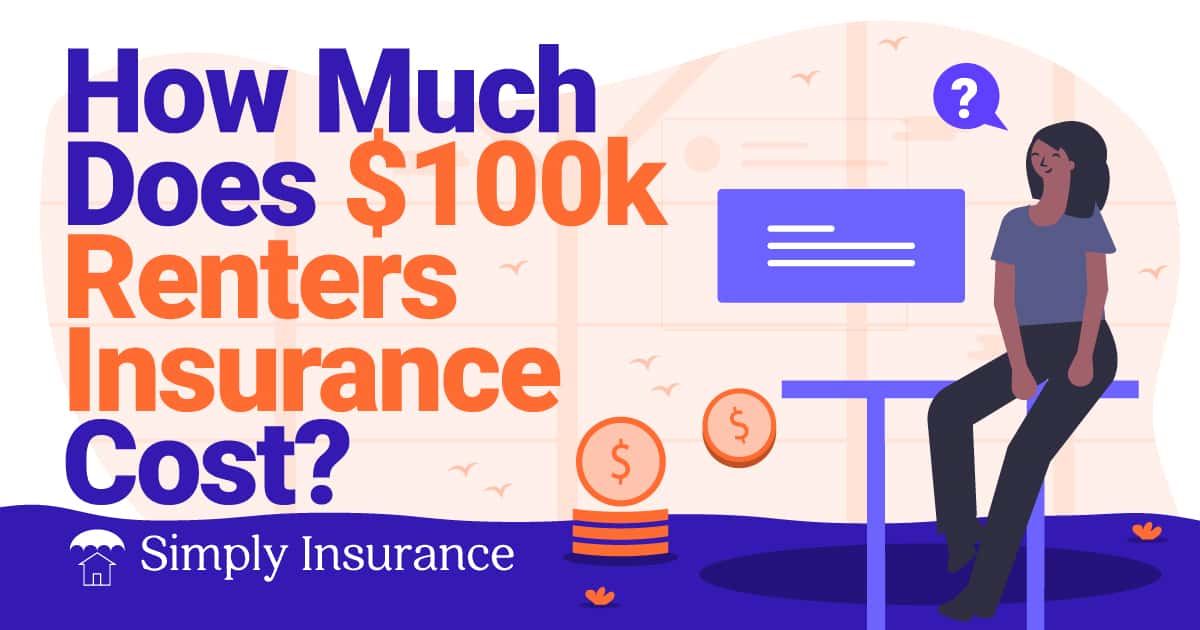How Much Does $100K Renter’s Insurance Cost in 2022?

Renter’s insurance is an insurance policy that protects your property and possessions.
Approximately 40% of renters have one as a safeguard against theft and natural disasters.
And believe it or not,
Renter’s insurance remains one of the most affordable forms of insurance.
The key is determining the appropriate policy for your needs. One of the most common policy limits is $100K, which covers most replacement costs for an individual.
Here is how to estimate the cost of a $100K renter’s insurance policy and how to get one.
How Do You Calculate Your Renter’s Insurance Needs?
There is no standard way to calculate renter’s insurance needs. You can use an online calculator or hire an appraiser to assist you.
The quickest method is creating a home inventory of your belongings and their value.
Go room by room and note the valuable items you own. That includes clothing, furniture, cookware, sporting equipment, and electronics, to name a few.
Include your receipts and take photos to document their condition.
Thorough documentation will streamline the compensation process in the event of a claim.
Renters Insurance made easy.
Agents not required.
Get quotes and sign up online without talking to an agent. But, we are here if you need us.
Unbiased, expert advice.
Get unbiased insurance education from licensed experts and also avoid dodgy sales calls.
Coverage in minutes.
You can get renters insurance coverage within minutes of getting your quotes and applying.
What Things Can You Cover with a $100K Renter’s Insurance Policy?
A $100K renter’s insurance policy will cover most, if not all, of your belongings. There are some exceptions, which we will get to in a moment.
The policy protects your possessions, while your landlord is responsible for insurance covering the building and structure.

You can divide renter’s insurance into three subcategories: personal property, liability, and additional living expenses.
Personal property includes your belongings, like clothing, appliances, and electronics.
Most insurance policies have a limit on these items and won’t compensate you if the property loss exceeds that threshold.
The liability portion applies if you hurt someone or damage their property. The insurance provider steps in to pay the claimant’s medical bills, so you pay almost nothing out of pocket.
Again, there are limits to how much an insurer will pay.
If your apartment or condo suffers a total loss, you’ll likely incur additional living expenses. You may need to live in a hotel temporarily while you look for another place to live.
Renter’s insurance covers any costs if your home becomes unlivable.
Renter’s insurance doesn’t cover everything. For instance, you need auto insurance to cover your car.
Specific high-value items, such as jewelry, art, and musical instruments, may require customized coverage.
The exact cost of the coverage and limits are negotiable with your insurance provider.
What Type of Coverage Does Your $100,000 Renter’s Policy Need?
Renter’s insurance comes in two types: replacement cost and actual cash value. Replacement cost is the price to replace your property with comparable items.
After you pay the deductible, your insurance provider covers the rest of the replacement cost.
The actual cash value is the replacement cost minus depreciation. The dollar value represents how much you would earn if you sold that item pre-loss.
An insurance provider calculates actual cash value using a couple of factors, including the brand, age, and property type.
How Much Does $100K Renter’s Insurance Cost?
The cost of renter’s insurance depends on where you live, with people in Mississippi paying the most per policy and renters in North Dakota paying the least.
The average $100K renter’s insurance policy costs $187 in 2020.
Here are the top five and bottom five states when it comes to renter’s insurance prices:
1
Mississippi – $244 per year
2
Louisiana – $242 per year
3
Alabama – $239 per year
4
Oklahoma – $234 per year
5
Texas – $228 per year
Least Expensive States for $100K Renter’s Insurance
1
North Dakota – $115 per year
2
South Dakota – $118 per year
3
Wisconsin – $130 per year
4
North Carolina – $134 per year
5
Utah – $145 per year
Insurance providers try to minimize their risk when approving policies.
States along the Gulf Coast and Tornado Alley are at an elevated risk of natural disasters, so insurers offset it with higher premiums.
Floods and tornados are among the most destructive natural forces and cause millions of dollars in damage each year.
Renter’s insurance prices can vary within a state and even a city. Insurers consider a range of factors, such as your neighborhood’s safety and your building’s age.
More expensive belongings merit more coverage, so if your apartment strictly has Gucci apparel and Restoration Hardware furniture, expect a higher premium.
Renters insurance by state.
How to Get $100,000 in Renter’s Insurance
To get $100,000 in renters insurance it’s actually pretty simple. All you need to do is click here or on any of the above buttons to get started.
You can look at a few companies; however, we recommend Lemonade they are super fast and have a very easy application process.
You can go through the quote process very fast and get covered in under 3 minutes for a renters insurance policy.
Taking Action
The average $100K renter’s insurance policy costs $187 per year. Most people can expect to pay somewhere between $115 and $244.
The policy protects your personal belongings up to a specified living, as well as additional living expenses.
There is no need to wait around if you need coverage, click here or on any of the above buttons to get things started.






